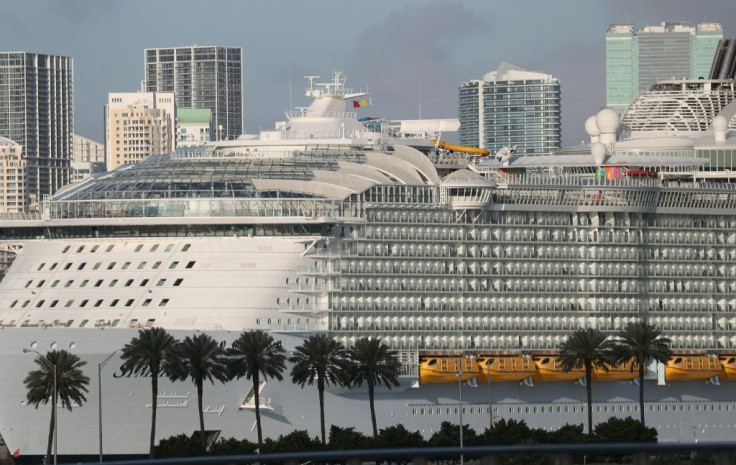‘Hole’ Found In Royal Caribbean COVID Testing After Passenger Tests Positive
Royal Caribbean (RCL) put a stop to its first sailing amid the coronavirus pandemic after an 83-year-old man tested positive for the coronavirus, despite a series of safety and health protocols that were designed to thwart the virus aboard its ships.
On Dec. 3, Royal Caribbean headed out on its first voyage since shutting down its operations due of the pandemic. The sailing featured its Quantum of the Seas passenger ship that had 1,688 passengers onboard – less than half of the 4,000 the ship was designed to hold, CNBC reported.
The voyage was the first of a four-night ocean getaway only for Singapore residents that was part of a test "cruise to nowhere." That title proved prophetic as trip was cut short and passengers were required to pass an antigen test to disembark the ship.
Royal Caribbean’s Healthy Sail Panel, a group headed by medical and science experts, had designed a “multilayered” health and safety system that included COVID-19 testing, face mask wearing, social distancing, enhanced cleaning procedures, and other required practices such as a Singapore Trace Together Bluetooth app or Token "tracelet" wristband that was required at all times during the cruise.
Passengers also were required to have a COVID-19 PCR test 48 to 72 hours prior to boarding the ship, according to Heidi Sarna, founder of the travel site Quirky Cruise and a passenger onboard the Quantum of the Seas cruise ship.
“I went on Friday to get my test and got [the results] on Saturday by email,” she told CNBC. “The cruise left on Monday.”
This created what Sarna said was a “a hole” in the safety protocol.
“I take the test, then I’m running around for a few days before the cruise,” she told the news outlet.
The gap in time between when a passenger takes the test and boards the ship is a challenge that Royal Caribbean and other cruise operators are wrestling with. Dream Cruises, which was also allowed to operate a “cruise to nowhere,” is using a less effective rapid antigen test, which produces tests on the date of departure but are less accurate.
Still, Sarna told CNBC she was surprised that someone on the ship tested positive for COVID-19 at all as Singapore, despite its population of 5.7 million people, has averaged less than one case per day over the last two weeks,
“It’s odd because there are virtually no cases in Singapore,” she said. “That’s the mystery.”
When it was determined that the man had tested positive for COVID-19, the ship immediately went into quarantine mode, which Sarna told the news outlet occurred at 1:50 a.m. The ship then docked in Singapore at 8 a.m., she said.
Sara also told CNBC that she does not know when the cruise ship will return , but she believes it will suffer the same fate as other ships that were stuck for weeks, saying, “We are at a different point in the way that COVID is dealt with, and Singapore is Singapore.”
But, Sarna added, she thinks Royal Caribbean’s protocols are working. According to Sarna, contract tracing has been “amazing” as the “tracelet” that passengers are required to wear has been “very thorough.” Royal Caribbean uses a custom wearable tracelet for crew and passengers to monitor physical distancing and contract tracing procedures.
Royal Caribbean told CNBC, “that passengers will be able to leave once contact tracing has been completed.”
“We identified and isolated all guests and crew who had close contact with [the positive COVID] guest, and each of those individuals have subsequently tested negative for the virus,” Jonathon Fishman, a company spokesman, told CNBC. “The ship has returned to port today in accordance with government protocols and will debark guests after a review of contact tracing is completed.
“That we were able to quickly identify this single case and take immediate action is a sign that the system is working as it was designed to do,” he said.
The man who tested positive for the virus was taken to the hospital and isolated, Bloomberg said.
Singapore has reported over 58,200 positive coronavirus cases and 29 COVID-19 deaths since the pandemic started, according to data from Johns Hopkins University.
Shares of Royal Caribbean were trading at $83.76 as of premarket open, up 93 cents or 1.12%.

© Copyright IBTimes 2025. All rights reserved.





















